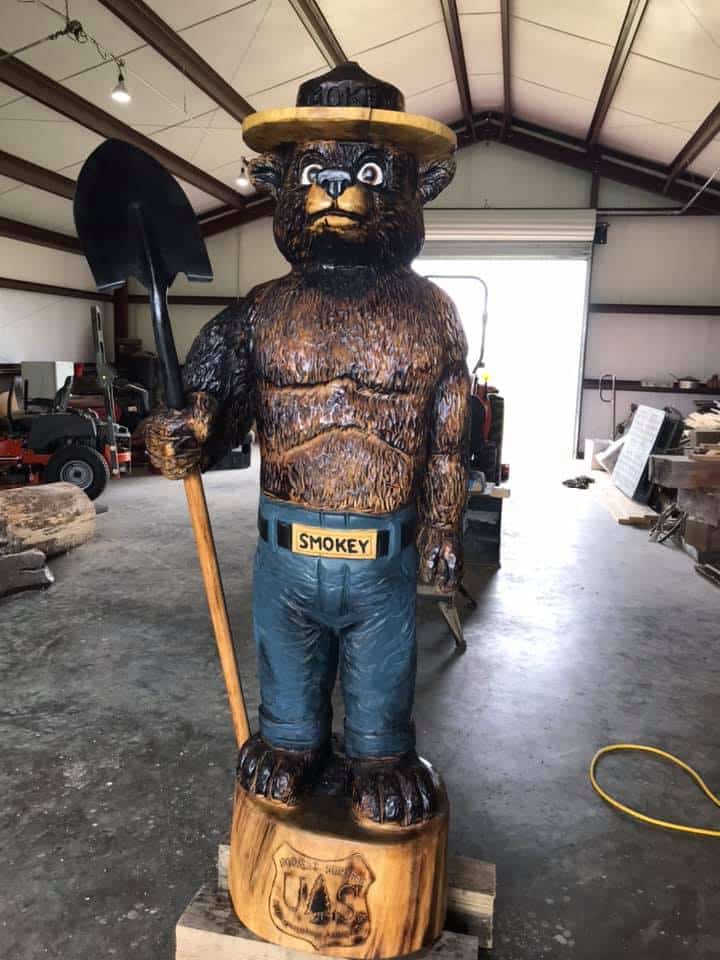Smokey Bear turns 80 this week, and I think it’s pretty cool that George County’s famous magnolia was carved into his image for display.
The magnolia referenced is a giant 250-year-old Magnolia Grandiflora, or Southern Magnolia, which made its debut on the National Register of Champion Trees on September 24, 2020. It had been nominated in 2014 by Lawrence P. Tucei, Jr. When it was last measured, in 2012, it had a trunk circumference of 211 inches, a height of 111 feet and a crown spread of 69 feet. Its fame only lasted a month as it was uprooted on the night of Oct. 28, 2020, when Hurricane Zeta’s injurious winds swept across George County downing trees and damaging structures. It had stood in the DeSoto National Forest north of Benndale near the Avent Community. Hundreds of nature-lovers had visited the tree through the years, often leaving carvings of their initials on its trunk. Years ago, it had gained the title as Mississippi’s largest magnolia. A sign once stood on Lucedale’s Main Street noting the distance to the state’s largest magnolia tree. However, it lost that status when a larger tree was discovered elsewhere in the state.
Unfortunately, most George Countians never knew of its crowning achievement to national status before it had fallen to Mother Nature. As Smokey Bear turns 80 this week, I find it fitting to inform folks that this mammoth magnolia lives on in the image of Smokey Bear. Daniel Hite of Big Creek Chainsaw Carving was commissioned in 2021 by the U.S. Forestry Service to carve Smokey Bear out of the majestic magnolia tree after it was downed the previous year by Hurricane Zeta. He carved it from a tree limb 32 inches in diameter.
“This was a cool project,” Hite said in a phone interview last week. “It’s probably the coolest carving I’ve done yet.” Nowadays Hite’s carving of Smokey Bear greets guests at the DeSoto National Forest office in Wiggins.

Before its demise, the broad-leaved evergreen was the largest known tree of its species in the country as reported to American Forests, according to the website americanforest.org. The tree was recognized not only for its size but also the critical ecosystem services it provided such as food and shelter for wildlife, its water purification abilities and its role in absorbing carbon dioxide from our atmosphere and storing carbon in its wood.
When the hurricane hit the tree, my friend and favorite tree lover, Becky Lumpkin Stowe, contacted me. She said, “I cannot imagine the sound that behemoth must have made hitting the forest floor.” She said when she learned it had fallen, she traveled to the site. “There were magnolia cones lying around, and I took a couple thinking I might be able to plant a seed and grow a tree with those glorious genes in it. It’s a natural thing, this changing of the forest guard. The tree is down, the space it inhabited is no longer shaded, which provides sunlight for new seedlings to spring up. The animals that break down wood will soon be at work and the tree will return to the soil, and its many carvings will disappear. We have our memories and the lucky ones have their photographs taken beside this grand magnolia.” Stowe is Director of Forest Programs for the Nature Conservancy’s Mississippi Chapter.
Thankfully the majestic magnolia lives on as Smokey Bear. The Smokey Bear Wildfire Prevention campaign is the longest-running public service campaign in U.S. history. Since 1944, the iconic symbol has taught millions they can prevent wildfires. The character was authorized on August 9, 1944, a date now celebrated as Smokey’s “birthday.” Smokey Bear’s message was originally “only you can prevent forest fires,” but after the reality that some fire was ecologically beneficial, Smokey’s messages was changed in 2001 to “only you can prevent wildfires.”
Sometimes Smokey Bear is referred to as Smokey the Bear. Adding “the” came about when country musician Eddy Arnold recorded the song, “Smokey the Bear” in 1952. Songwriters had added “the” to the bear’s name simply for rhythmic purposes.
Regardless of your memories of witnessing the grand magnolia or your memories of Smokey Bear’s 80-year-old message, it is comforting to know both live on.